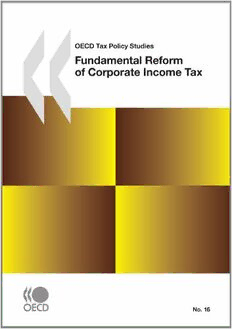
OECD Tax Policy Studies No.16 Fundamental Reform of Corporate Income Tax (Oecd Tax Policy Studies) PDF
174 Pages·2007·2.118 MB·English
Most books are stored in the elastic cloud where traffic is expensive. For this reason, we have a limit on daily download.
Preview OECD Tax Policy Studies No.16 Fundamental Reform of Corporate Income Tax (Oecd Tax Policy Studies)
Description:
Policy makers in OECD countries are concerned about whether they can maintain their current levels of corporate income tax revenues and how they can create an attractive investment climate for domestic and foreign investors. This report presents the recent trends in the taxation of corporate income in OECD countries and discusses the main drivers of corporate income tax reform and evaluates the gains of fundamental corporate tax reform. The corporate tax-induced distortions are discussed from a domestic and international tax point of view. This study also considers tax revenue and tax complexity issues. The book also explains a series of alternative systems that might be implemented.Table of Content : Executive Summary Introduction PART I. SETTING THE STAGE Chapter 1. Trends in the Taxation of Corporate Income in OECD Countries Chapter 2. Why Levy a Corporate Income Tax? Chapter 3. Fundamental Corporate Income versus Consumption Type of Tax Reform PART II. DOMESTIC AND INTERNATIONAL CORPORATE INCOME TAX ISSUES Chapter 4. The Main Drivers of Corporate Income Tax Reform in OECD Countries Chapter 5. Integration of Corporate Income and Personal Income Taxation PART III. DOMESTIC AND INTERNATIONAL CORPORATE CASH-FLOW ISSUES Chapter 6. Corporate Cash-Flow Taxation Chapter 7. Corporate Cash-Flow Tax Issues in an International Context Chapter 8. Corporate Tax-Flow Tax Experiences PART IV. FUNDAMENTAL CORPORATE TAX REFORM IN DETAIL Chapter 9. Alternative Corporate Tax Systems in More Detail -Full Integration Tax System -The Allowance for Corporate Equity Tax System -The Allowance for Shareholder Equity Tax System -The Shareholder Allowance for Corporate Equity Tax System -The Comprehensive Business Income Tax System -Destination-Based Corporate Cash-Flow Tax -Origin-Based Corporate Tax-Flow Tax PART V. POLICY CONCLUSION -Tax Revenues -Efficiency Considerations -Tax Complexity -Corporate Cash-Flow Tax Reform -Fundamental Corporate Income Tax Reform Tax Glossary References
See more
The list of books you might like
Most books are stored in the elastic cloud where traffic is expensive. For this reason, we have a limit on daily download.
